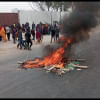Accord: blessing turns burden?
The call for suspending the operations of the Accord, an inspection and remediation platform of more than 200 global clothing retailers and brands, has been getting louder as garment factory owners are being forced to spend several billion dollars to improve workplace safety.
It comes despite international community's call for its continuation.
The platform was set up to streamline Bangladesh's apparel industry after the Rana Plaza disaster that claimed more than 1,100 lives in 2013.
But over the years, it has turned into “a nightmare from a blessing,” putting “excessive” pressure on factories to spend billions of dollars on compliance issues even as apparel prices fall, exporters say.
Just two weeks ago, the platform sent letters to its signatories (buyers) to sever business ties with 532 RMG factories in Bangladesh for their “slow progress” in upgradation.
The Supreme Court is expected to deliver a verdict on an Accord petition for extension tomorrow.
After an initial five-year term that ended in May this year, the High Court extended its contract by six months until November 30. The Netherlands-based watchdog now wants another extension until 2021 to “complete its unfinished work”.
Recently, the European Parliament adopted a resolution, seeking an extension of its work in Bangladesh. The International Labour Organisation also supports an extension.
However, many factory owners allege the Accord is putting too much pressure on them, sometimes for “negligible” issues.
One factory owner claimed he spent Tk 38 crore on remediation to strengthen workplace safety over the past five years in line with Accord recommendations.
He has installed the sprinkler system, expensive fire doors and new water pumps, streamlined the electrical wires, and constructed new walls breaking the old ones at all his six factories in Ashulia.
With the remediation nearly complete, he was waiting to receive the certification from the Accord.
“But I was surprised when the Accord engineers visited my factories again 15 days ago and asked me to re-fix some problems, which we already did as per their recommendations. Now I will have to spend a few more crore to fix the problems. It's a burden for me,” he said, asking not to be named.
“Accord engineers often threaten to cut business ties if the problems are not fixed and re-fixed in line with their recommendations. I do not want the Accord anymore,” said the manufacturer, whose annual exports are worth more than $135 million.
All the five other RGM exporters The Daily Star has spoken to share his sentiment.
They do not want any more extension for the Accord, they said, adding that they already spent billions of dollars for remediation of three kinds of flaws -- structural, electrical and fire -- in their factories.
Depending on their business size, owners have spent between Tk 5 crore and Tk 20 crore on each factory on remediation, according to Bangladesh Garment Manufacturers and Exporters Association (BGMEA).
Tasked with ensuring fire and building safety compliance, the Accord has inspected more than 2,000 factories and helped draw up plans to fix 150,000 structures and prevent fire hazards so far.
“But the Accord has become a name of mental torture for me now. It has been putting pressure on us constantly for further remediation, sometimes when the work is near-complete,” said Mohammed Hatem, former vice-president of Bangladesh Knitwear Manufacturers and Exporters Association (BKMEA).
“I do not think the Accord should stay here anymore. Every day, it is imposing new action plans on us,” said Hatem, who has a factory in Narayanganj.
Factory owners have been spending money without asking any question as they have to do business with companies who are Accord signatories. But it cannot go on forever, he added.
“The factories bear all the brunt of additional expenses while the signatory brands keep on bargaining for cheaper prices. It is as if owners alone are responsible for improving the workplace conditions while the buyers will not spend a single penny for the purpose,” said another factory owner, preferring not to be named.
A recent study by the Centre for Global Workers' Rights found the nominal prices of major product categories are falling.
“Between 2011 and 2016, the price drop for garments exported to the US was about 11 percent, in comparison to a 9 percent decline for EU apparel exports,” says the report.
The study was based on sales data from 211 Bangladesh suppliers of international apparel brands.
The Accord has also played a major role in slowing the growth of an otherwise thriving garment industry in Bangladesh, said industry insiders.
After the Rana Plaza disaster, some 1,200 small and medium factories were shut for failing to either achieve factory remediation or meet strong compliance requirements of buyers, according to the BGMEA.
For example, in 2012-13, there were 5,876 active garment factories affiliated with the BGMEA. In just one year, it came down to 4,222.
It rose to 4,560 in 2017-18 as owners of some big business groups reinvested and opened new complaint factories.
However, subcontracting firms, which was once the main source of developing fresh entrepreneurship in the apparel sector, died a slow death as a result of stringent compliance.
Khondaker Golam Moazzem, research director at the Centre for Policy Dialogue, said he was in favour of a brief extension of the Accord.
This will give the local inspection body, Remediation Coordination Cell (RCC) set up in May last year, some time before it becomes fully functional, he said.
Nazma Akter, president of Sommilito Garments Shomik Federation, a workers' rights group, supports the idea.
“Our position is and has been that it is useful for the Accord to continue to help in promoting industrial safety as long as it is necessary for those factories that are under Accord to be remediated,” said Tuomo Poutiainen, country director for the International Labour Organisation.
He too supports its extension until the RCC is strengthened.
On November 19, the IndustriALL Global Union urged the government to lift the High Court ban on Accord's operation.
Rob Wayss, executive director for Accord Bangladesh Operation, did not respond to The Daily Star's request for comment.
However, Joris Oldenziel, deputy director of the Accord on Fire and Building Safety in Bangladesh, told Reuters on November 21, “The consequences of a closure of the Accord liaison office in Bangladesh will be significant, immediate and damaging.”
Any premature shutdown of the Accord, leaving workers in unsafe circumstances, would jeopardise brands ability to source from a safe industry, he added.
Commerce Minister Tofail Ahmed, who spoke to Reuters on the same day, said, “We don't need them anymore.”
He added that the government was capable of monitoring factories.
Siddiqur Rahman, president of Bangladesh Garment Manufacturers and Exporters Association, declined to comment, saying it was now a matter for the court do decide.
Smart Jeans Limited challenged the operation of Accord last year. The court later ordered it to close its Bangladesh office by November 30.

 For all latest news, follow The Daily Star's Google News channel.
For all latest news, follow The Daily Star's Google News channel. 








Comments